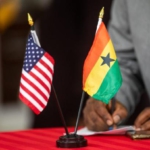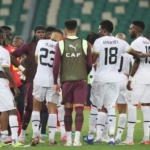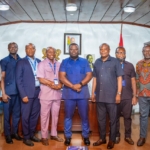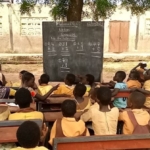
The controversial agreement between the government of Ghana and the United States to accept West African third-country deportees is currently facing a triple threat: a Supreme Court challenge, intense domestic political scrutiny, and severe human rights accusations. As of mid-October 2025, the controversy centres on the total number of deportees (now 42), their detention conditions, and the legality of the deal’s execution.
International Context: The Trump Administration’s Third-Country Program
The Ghana agreement is not isolated but is part of a broader, largely secretive initiative by the U.S. President Donald Trump administration to outsource migration management. Since July 2025, the U.S. has struck similar third-country deportation agreements with at least five African nations. Deportees have also been sent to Eswatini, South Sudan, and Rwanda, with an agreement also in place with Uganda (though no deportations have yet been announced there). Rights groups globally have protested this program, citing its lack of transparency and the risk it sends deportees to countries where they lack ties and face denial of due process.
The Legal and Constitutional Challenge
The U.S.-Ghana deportee deal faces a serious constitutional challenge, with the Supreme Court set to test the executive’s treaty-making power regarding international agreements. The immediacy of the legal crisis is highlighted by the Supreme Court fixing Wednesday, October 22, 2025, for the hearing of an interlocutory injunction filed by Democracy Hub to halt the agreement’s implementation.
The prominent Ghanaian civil rights and advocacy group, Democracy Hub, spearheaded by activist Oliver Barker-Vormawor, filed a lawsuit arguing the agreement is unconstitutional. They contend the arrangement was not approved by the Ghanaian Parliament, violating Article 75 of Ghana’s constitution which mandates legislative resolution and ratification for certain international agreements. Democracy Hub’s core legal and ethical position was encapsulated in a recent statement: “No administration has the right to commit Ghana to secret agreements that undermine constitutional and human rights obligations,” emphasising the need for transparency, legislative oversight, and respect for human dignity in international engagements.
The group further explicitly cites the use of the Bundase Military Training Camp as a detention site for civilian deportees as a violation of fundamental rights guaranteed under Articles 14, 15, and 19 of the Constitution (protecting personal liberty, human dignity, and fair trial), and asks the Supreme Court to declare this detention unlawful. The lawsuit explicitly asks the Supreme Court to stop the “onward deportation” of individuals facing persecution, a practice critics argue violates international conventions against non-refoulement, including the 1951 Refugee Convention, the Convention Against Torture, and the OAU Refugee Convention.
This legal strategy views Ghana’s action as an attempt to circumvent international obligations. The severity of this approach was highlighted by legal counsel in a related US lawsuit. Lee Gelernt, an ACLU attorney representing the deported African migrants, stated that the entire situation “reeks of a scam.” He further asserted: “It seems evident that the United States has concocted a scheme to use third countries to circumvent what the United States cannot do directly.”
Government Defense and Opposition Stance
The ruling National Democratic Congress (NDC) party has defended the executive action on the basis of the Pan-African principle. President John Mahama insisted the decision was “grounded purely on humanitarian principle and Pan-African solidarity” to offer temporary refuge. Foreign Minister Samuel Okudzeto Ablakwa maintained the deal was a “Memorandum of Understanding” (MOU) that did not require lawmakers’ approval, distinguishing it from a formal treaty. Minister Ablakwa also publicly confirmed the transactional nature of the agreement, stating that Ghana’s acceptance of the deportees was in exchange for the lifting of U.S. visa restrictions on Ghanaians, potential extension of a trade deal, and a re-evaluation of the 15% tariff.
Conversely, the opposition New Patriotic Party (NPP), through Samuel Abu Jinapor, argues that operationalising the agreement without parliamentary ratification is a “direct constitutional violation and an affront to the authority of the Supreme Court.”
The High Stakes: Outcomes of the Supreme Court Lawsuit
The Supreme Court’s decision will not only determine the fate of the deportees but will set a profound precedent for the balance of power and Ghana’s global positioning.
Scenario 1: Government Wins (Pact is Constitutional)
If the Supreme Court rules in favour of the government, declaring that the executive had the authority to sign the MOU without parliamentary ratification, the consequences will be:
- Executive Power Validation: The ruling would grant the executive branch expansive, unchallenged power in foreign policy matters, potentially bypassing legislative oversight for future international agreements.
- Continuation of Deportation Hub Role: Ghana would solidify its role as a key de facto third-country processing centre for the US, likely leading to an increase in future deportations and a sustained logistical and financial burden on Ghana’s unbudgeted resources.
- Domestic Dissatisfaction: While visa and trade benefits may be secured, the public perception that the government “traded away our national dignity for visa concessions” would continue to fester, fueling opposition and domestic constitutional debates.
Scenario 2: Government Loses (Pact is Voided)
If the Supreme Court rules in favor of Democracy Hub, declaring the agreement void for violating Article 75, the consequences will be:
- Reassertion of Parliamentary Authority: This would be a landmark victory for Ghana’s constitutional democracy, restoring Parliament’s legislative check on executive overreach in international affairs. It would force greater transparency in future dealings.
- Immediate Pact Nullification: The agreement would be immediately voided, compelling Ghana to halt all further deportations under this framework and preventing future flights from the US.
- Human Rights Victory: It would be a strong affirmation of Ghana’s commitment to the principle of non-refoulement, even in the face of foreign pressure, providing a potential remedy for the remaining deportees.
Reputational and Geopolitical Impact
Regardless of the court’s specific ruling, the litigation has already indelibly marked Ghana’s international standing.
The most significant reputational damage stems from the breach of non-refoulement and the alleged onward deportation of individuals to countries where they face persecution. The onward deportation of 10 West Africans (only two of whom were Togolese nationals) to Togo, and the immediate re-deportation of a bisexual Gambian man to The Gambia (where same-sex relations are criminalised) directly undermines the government’s claim of “Pan-African solidarity.” This practice forces regional neighbours to absorb the human and administrative costs of the US policy, severely damaging Ghana’s standing within the Economic Community of West African States (ECOWAS).
Erosion of Sovereignty and Trust
The explicit confirmation by the Foreign Minister that the deal was a diplomatic “quid pro quo”—exchanging human lives for visa concessions—has deeply eroded public trust and national dignity. This sentiment is best captured by market trader Ama Owusu, who lamented the government “traded away our national dignity for visa concessions.” This moral concern about acting as “America’s processing centre” is leading to domestic and diaspora anxiety about putting an “unfair burden on our home country’s resources” and diverting funds from essential domestic services.
Foundational Test
Ultimately, the U.S.-Ghana deportation agreement has evolved from a simple diplomatic transaction into a foundational test for the West African nation. The outcome of the legal challenge, beginning with the October 22, 2025, injunction hearing, will set a precedent for how Ghana balances economic and diplomatic expediency with its binding commitment to international human rights conventions and its own constitutional checks and balances in a world grappling with increasingly complex global migration issues.




